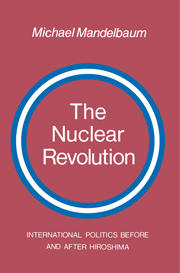Book contents
- Frontmatter
- Contents
- Preface
- 1 The nuclear revolution
- 2 Nuclear weapons and chemical and biological weapons
- 3 The balance of power in the nuclear age
- 4 Arms competition: The nuclear arms race and the Anglo–German naval rivalry
- 5 Arms competition: The nuclear arms race and tariff competitions
- 6 NATO: The nuclear alliance
- 7 The nuclear presidency
- 8 The bomb, dread, and eternity
- Notes
- Index
7 - The nuclear presidency
Published online by Cambridge University Press: 26 January 2010
- Frontmatter
- Contents
- Preface
- 1 The nuclear revolution
- 2 Nuclear weapons and chemical and biological weapons
- 3 The balance of power in the nuclear age
- 4 Arms competition: The nuclear arms race and the Anglo–German naval rivalry
- 5 Arms competition: The nuclear arms race and tariff competitions
- 6 NATO: The nuclear alliance
- 7 The nuclear presidency
- 8 The bomb, dread, and eternity
- Notes
- Index
Summary
History of the nuclear presidency
International politics operates on three levels. The anarchical structure of the international system produces the problem of security that is common to all states. The character of each individual state – its history, its political system, the temperament of its citizens – shapes its response to that problem. Ultimately, however, it is the people of each state who decide how to respond. The basic unit of international politics is the individual.
Each of the three levels is important in Thucydides's account of the Peloponnesian War. He finds the fundamental cause of the conflict to be the structure of the system of independent city–states in fifth-century B.C. Greece. “What made war inevitable,” in his view, “was the growth of Athenian power and the fear which this caused in Sparta,” a fear ultimately rooted in the fact that in a system without a supreme authority any powerful member automatically becomes a potential threat to all the others. The contrast between democratic, commercial Athens and autocratic, agrarian Sparta is a major theme in the chronicle. Thucydides depicts the roles of individual Athenians and Spartans as crucial. He stresses particularly the roles played by the leaders on both sides.
If his history has a hero it is the Athenian Pericles, a shrewd, steady, and farsighted statesman who was not only able to divine the proper course for Athens but to persuade his fellow citizens to follow it. Athens's downfall began with the death of Pericles. When he passed from the scene, the leadership of the city–state fell into the hands of men less able, less unselfish, and less dedicated to the public weal than he.
- Type
- Chapter
- Information
- The Nuclear RevolutionInternational politics Before and after Hiroshima, pp. 177 - 206Publisher: Cambridge University PressPrint publication year: 1981



